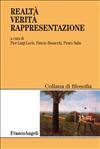
LIBRI DI SILVANA BORUTTI


Il ruolo del concetto di verità diventa sempre più complesso, se si prendono sul serio le differenze nei modi di accedervi e nei campi oggettivi di riferimento; ciò dà spazio a uno spettro molto ampio di posizioni filosofiche, fra loro contrastanti, che rimescolano le carte delle tradizionali controversie tra realisti, antirealisti, relativisti. I saggi qui compresi costituiscono un momento di incontro volto ad afferrare e discutere la fisionomia di queste controversie.
cod. 230.102

Imagination and Human Boundaries. Darstellung and Einstimmung in Kant and Wittgenstein - This essay focuses on the occurrence of two words-concepts in Kant’s and Wittgenstein’s texts: Darstellung, which designates in both philosophies the imaginative activity of exhibition or presentation, essential in the experience of meaning, and Einstimmung, which designates the inter-subjective communicability of meaning. In Kant’s philosophy, Darstellung plays a fundamental role in connecting the cognitive faculties. It refers, on the one hand, to the sublime character of imaginative power, which makes representation free from presence, and, on the other hand, to the inter-subjective and communicable character of this human capacity. By Darstellung also Wittgenstein refers to the presence of meaning in the logical form of language, and, at the same time, to the impossibility of representing language as an object. Imagination also presides over the communicability of meaning understood as an agreement, that is both a consonance of voices and a consent inscribed in the body.
Key words: Agreement, Imagination, Presentation, Seeing as, Showing, Sublime.
Parole chiave: Darstellung, Immaginazione, Mostrare, Sublime, Übereinstimmung,


cod. 1406.4

cod. 1330.60

cod. 1090.15